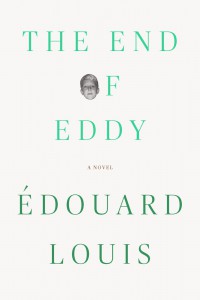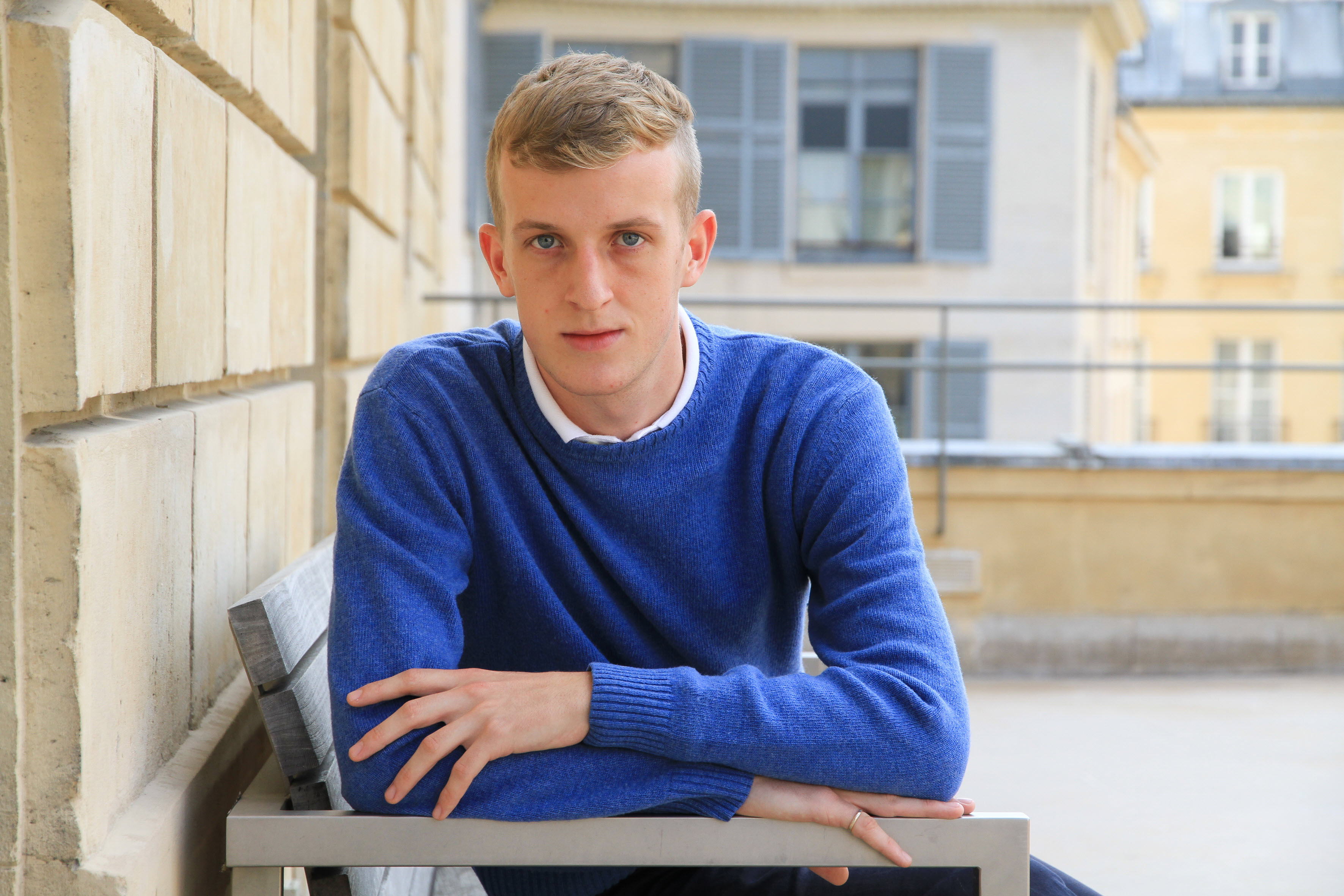Édouard Louis’s debut novel The End of Eddy gives voice to a demographic often excluded from mainstream literature—the elusive “white working class” so frequently cited by politicians and publishers lately—while also telling the story of a young man who is completely rejected by that same group. In this apparent contradiction lies the work’s most remarkable achievement: to illuminate the lives of, and even empower, the narrator’s own antagonists—without forgiving them.
Bear in mind this is a work of autofiction, á la Knausgaard’s My Struggle opus or Sergio del Molino’s Lo que a nadie le importa, completed when the author was just twenty years old. Any editor would expect a manuscript so early in a writer’s life and career to lack “perspective,” to need some “distance,” especially given the drama and violence in this story in particular. Most memoirists don’t like to be too close to the time and people they’re writing about—and I did have to continually remind myself I was not reading a memoir while falling headfirst into Louis’s story. The lumps the character Eddy has taken have certainly not gone down, but that they are still swollen and purple is just what makes the read so engrossing, and makes the strange duality of the characters’ sympathetic and reproachable natures believable.
The book was first published in France in 2013 to great acclaim, making the now 24-year-old something of a literary star. Out this month in the U.S. with Farrar, Straus, and Giroux, and translated by Michael Lucey, the work has begun to receive a lot of attention in English, too. Louis has had his critics, however, particularly regarding the work’s believability—a plight that perhaps inevitably threatens the autofiction writer. There is something inherently uncomfortable about reading such a novel; you can’t settle in and let the story carry you to a made-up place and time, but at the same time you can’t walk away feeling you know something for sure, something you can report to a friend later. One can’t help but want to know after all, is it real or not?
Louis has said in interviews that the book is all true. The Eddy of the story is based on the child he once was but has now “finished with”, as the original French title conveys. He changed his name when he got out of the remote, poverty-stricken village where he grew up to attend boarding school, and later university. “It sounds dramatic,” Louis said in an interview with The Paris Review last year, “but yes, I wanted to kill him—he wasn’t me, he was the name of a childhood I hated. The book shows how—before I revolted against my childhood, my social class, my family and, finally, my name—it was my milieu that revolted against me.” Eddy tries until the last moments before his departure to fit in, to reject his instincts, to change himself to make his parents less ashamed. He explains his rituals to that end in one of the most heartbreaking passages of the book, which captures the pure, itchy loathing for one’s own existence that only adolescence truly knows:
Every morning in the bathroom getting ready I would repeat the same phrase to myself over and over again so many times that it ceased making any sense, becoming nothing but a series of syllables, of sounds. Then I’d stop and start over again Today I’m gonna be a tough guy. I remember it because I would always repeat exactly the same sentence, in the same way as you repeat a prayer, in the same words, the same exact words Today I’m gonna be a tough guy. (And now I’m crying as I write these lines; I’m crying because I find that sentence hideous and ridiculous, this sentence that went everywhere with me for several years and was, I don’t think I’m exaggerating, at the center of my being).
Eddy’s family’s values are as complicated and nuanced as the characters themselves: their lack of education and rural way of life are sources of both pride and shame—brute violence is part of everyday life and toughness encouraged, yet Eddy’s father prides himself on never hitting his kids like his father hit him; homosexuals should all be taken out back and shot, yet when an openly gay man is threatened at a village dance, it is Eddy’s father who protects him from the mob. Eddy’s mother hides her shame over her husband’s unemployment and the holes in her walls by taking pride in what young people might even call being “chill.” “I like to have a good time, I don’t pretend to be a lady, I am what I am, ordinary,” she says. But Eddy muses, “To be ordinary, as if pride were not the first manifestation of shame…In the end maybe what she was trying to say was I couldn’t be a lady if I tried.”

(May 2017, Farrar, Strauss and Giroux)
Though Eddy’s “effeminate” mannerisms attract the village gossips and bullies, that Eddy might be gay is a taboo topic among his family members. Interestingly, Eddy’s walk and talk and hand gestures don’t just suggest homosexuality to his community, but also a sense of sophistication and pretention—they call him “fancy,” as if he thinks he is better than them. This is both a convenient avoidance of his homosexuality altogether as well as a further threat to their pride. Sophisticated manners aren’t something the men in the village can show up with their fists, though they surely give it their best efforts. Eddy’s older brother threatens him regularly with violence; his sister sets him up with an eighteen-year-old girlfriend when he is just thirteen and leaves them in her apartment together overnight, to Eddy’s utter panic and humiliation; two boys at Eddy’s middle school beat him up and spit on him every single day in the same spot.
Despite his lack of distance from the experiences he relates in the book, Louis is self-aware and unflinchingly honest in his writing, to the point that his style could almost be called distant—except that when his habitual tormentors at school spit into Eddy’s face in the opening scene, you feel their warm saliva on your skin. You smell their breath and cringe. The writing is as raw in form as the emotions he conveys; spare sentences and unrelenting detail illustrate the violence and grime that characterize Eddy’s childhood—details that might have been blurred or blacked out if the author had waited longer to tell his story. And yet the narrator’s bluntness feels devoid of self-pity.
After two years of being together in this hallway on a daily basis, I knew them better than anyone else. I could tell on which days they were tired, on which days less so. I swear that there were times when one of them seemed sad, and I would feel sorry for him, worried about him.
But Louis’s impressive sympathy for his characters doesn’t prevent him from remembering the unpleasant facts of his experience. He adds, “When they spat in my face, I could have told you what they’d been eating. By now I knew them really well.”
This is a perfect time to launch such a book in English, surely a strategic decision on the part of the publisher, given that the recent French presidential elections garnered a rapt international audience waiting for the results of the latest test of rightwing populism’s stronghold in Western Europe. Marine Le Pen’s ultimate defeat by Emmanuel Macron was received with a seemingly worldwide collective sigh of relief (excluding a few notable politicians; they and everyone else know who they are). But Le Pen’s base very much fits the demographic of Eddy’s village, and her popularity remains an important phenomenon to untangle.
The End of Eddy could be thrown into the bucket of literature that’s come out of—or dare I say pandered to—this sudden urbanite interest in the psychology of the rural, white working class and the “rise of populism” in western democracies. But Louis’s story is worth pulling out of the pile because it doesn’t seem to exist solely to explain to rich white people why poor white people don’t know what’s good for them. Louis does illuminate why his village voted for Le Pen, but he focuses on a higher, less abstract cost of ignorance and intolerance: the hatred and prejudice the village shows Eddy, one of their own. No family loyalty protects him; no gradual acceptance of homosexuality or difference arises because the community was finally confronted with a gay man in their own backyard. This book, unlike many others in its category, doesn’t just portray an isolated population whose lack of opportunity is tragic and understandably affects their decisions at the polls. It also shows the flipside, and a range of other complications in between. In fact, describing the horrible treatment Eddy endured as a child in a novel rather than a memoir may have allowed the author to be as brutal as he felt he needed to be with less risk of backlash or of sounding bitter and selfish.
In the end, what’s most informative—if we want to consider the work in such terms—about Eddy’s story and his village’s story is that Eddy didn’t think, I don’t agree with these people, I have to leave. He didn’t look at his parents with disgust or think their beliefs were backward or wish they read books instead of watching Wheel of Fortune—“the Wheel,” or simply, “our show” —every night while getting steadily pissed-drunk. Eddy didn’t read the news or excel in school or dream of being a writer or going to college. He tried with such violent passion and self-betrayal, even self-degradation, to fit in with these people—his people—that it’s nearly unbearable to read about in parts. He wanted them to be proud of him, or at the very least, to not have to be ashamed of him, or share in the shame he felt he deserved. And in turn, the village wanted none of the shame that more cosmopolitan, educated folks could make them feel, so they took pride in their violence and dirtiness and lack of education and tried to impose that all on Eddy, too. When Eddy starts dating his first girlfriend, his mother calls everyone’s attention to it at the dinner table. Eddy naturally feigns embarrassment at the invasion of privacy. “In reality I was doing the best I could to hide the pride and joy that were bubbling inside me. At least for one evening, I had managed to banish my mother’s doubts. Her face looked relieved.”
Madeline Jones is an editorial assistant at Henry Holt and Company and a U.S. Editor-at-Large for Asymptote. She lives, writes, and eats mac and cheese in Brooklyn.
****
Read More Reviews:
What’s New in Translation? May 2017
In Review: Abdulai Sila’s novel confronts the future of Guinea-Bissau
In Review: Jorge Argueta’s Bilingual Memoir About Fleeing El Salvador for the States

